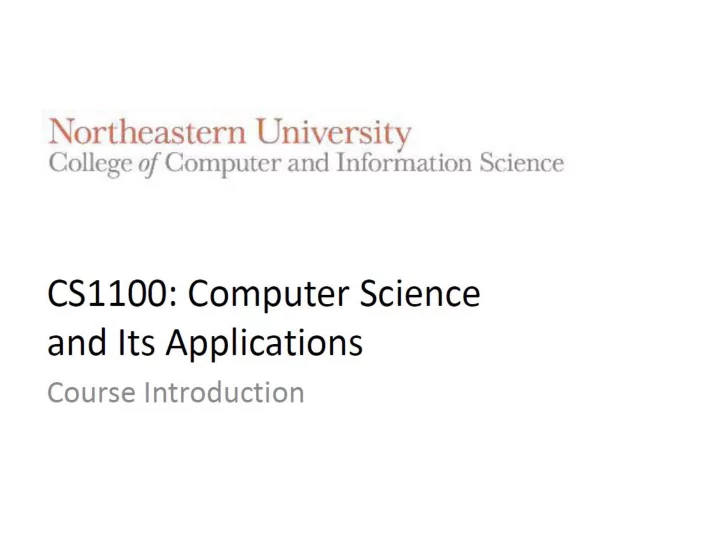

Leena Razzaq Office: 310BWVH Email: lrazzaq@ccs.neu.edu Office hours: Monday 11am-1pm or by appointment jys
Course Web Site • http://www.ccs.neu.edu/course/cs1100su14 – Also linked from Blackboard • Course Materials – Excel Tutorials – Access Tutorials – PPT Slides • Blackboard: – Submit Labs, Quizzes, Tests – Grades
Communication • Communication through Blackboard’s email feature – Be sure your Blackboard email address is correct and that you check it often • Piazza Discussion Group – Anonymous posts are fine.
Grading & Assessment Assessment Grade % Excel Quiz 10% Excel Test 25% Access Quiz 10% Access Test 25% Lecture Quizzes 5% Excel Part of Final (optional) Average with Excel Test Access Part of Final (optional) Average with Access Test Excel Labs (5) 12.5% Access Labs (5) 12.5% Lab 0 Mandatory, but 0% • A better test grade replaces a lower quiz grade. jys
Course Format • There are four class sessions per week, all held in the computer lab, WVH 210. • Class sessions alternate between lecture/discussion of the material, and time to work on lab assignments. • Lectures will end with a very short quiz. Lecture quizzes are worth 5% of your final grade. • Attendance in lab sections is optional if all lab assignments due to that point have been submitted. – I.E. You may leave (quietly, please) when you are done. – You may miss additional explanation/clarification of previously discussed material, but never new material. CS1100 Course Introduction 9
Lab Assignments • Labs are intended to reinforce and deepen your study of the covered material • You are expected to not only study the provided resources, but investigate additional resources • Labs are to be completed individually • Late submissions are subject to penalties
Late Submissions • 20 percentage points will be deducted per late day from assignments which are submitted after the due date. • The only exception is a valid medical excuse accompanied by a physician's note. CS1100 Course Introduction 11
General Principles • Assume Your Data May Change! – It is best practice when creating spreadsheets or writing database queries to assume that the given data for a problem might change.
General Principles • Don’t Duplicate Given Data! – Since the given data for a problem may change, this data should appear in one place only. – If data given for a problem is repeated in many places, then changing that data will require changes in many places. • This can be a source of errors as well as a source of unnecessary work.
General Principles • Ask the Right Question! – Make sure your formulas will not only work for this data set, but they will work for ANY data set. – If the data changes, the answer should be correct for the new data set.
A Trivial Example • Here is a simple problem to illustrate the concept of “Ask the Right Question” – You are asked to find the sum of the following numbers: 2, 5, 7, 8
What’s wrong ? • Cell A6 has the correct answer, i.e. 22 • However, notice the formula box contains the number 22. • This means that the answer 22 is “hard - coded” in the selected cell. (Hard -coding a correct answer is worth fewer points than a formula that gives an incorrect answer.) • If one of the given data cells changed, say A1 was changed from 2 to 3, then the spreadsheet would look like this: jys
• The spreadsheet now appears to say that the sum of 3, 5, 7 and 8 is 22 • This is the wrong answer, but the error is not obvious without careful inspection. jys
What’s wrong? • In this example, cell A6 again shows the correct answer. • Also the formula box shows that A6 contains a formula for the answer, and not the number 22 itself • However, the formula in cell A6 repeats the data that appears in cells A1 – A4 • If the value in cell A1 were changed to 3, then the sum would again be incorrect jys
What’s wrong? In this example: • Cell A6 shows the correct value • Cell A6 has a formula not a hard-coded value • The formula does not repeat any data But: The formula does not solve the problem of finding the sum of the cells A1 – A4, and only accidentally gives the right jys answer
The Fix • Notice that the formula box now contains a formula for calculating the sum • The SUM function adds all the numbers that you specify as arguments. • If one of the cells containing given data changes, the cell containing the answer will change appropriately. jys
General Principle • Decompose Complex Problems!
Comparison • The Monolithic solution calculates the monthly balance with one complex formula • The Solution with intermediate results, performs the same calculation by breaking up the complex formula into three simpler formulas.
Dividing the solution into smaller parts has advantages 1. It is easier to catch mistakes – There are more results that can be checked 2. It is easier to verify correctness – Verification can be done step by step 3. It is easier to reuse the parts – Say you are asked to find the total amount paid for the loan, it would be easier to make the necessary changes
Syllabus Quiz • All students must take the syllabus quiz and earn a score of 100% in order to pass the course. The syllabus quiz does not count towards a student's grade. The quiz can be taken as often as needed to pass with a score of 100%. The quiz is administered through Blackboard. • You must have 100% on the syllabus quiz by Monday. jys
Recommend
More recommend